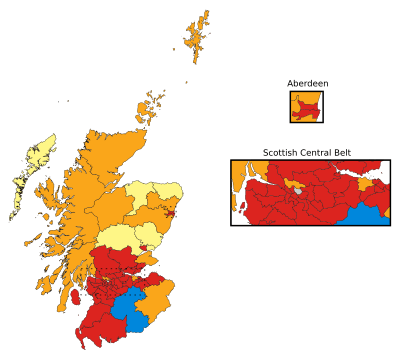List of MPs for constituencies in Scotland (2005–2010) facts for kids
|
|
|

Colours on map indicate the party allegiance of each constituency's elected member.
|
The 2005 United Kingdom general election was a time when people in the UK voted for who would represent them in the House of Commons of the United Kingdom. This is the main part of the UK Parliament. In Scotland, voters chose 59 Members of Parliament (MPs). These MPs represented different areas, called constituencies, across Scotland. They served in the UK Parliament from 2005 to 2010.
Contents
How Many MPs Did Each Party Have?
At the start of this Parliament in 2005, different political parties had a certain number of MPs from Scotland. The Labour Party had the most MPs.
| Party | Number of MPs | |
| Labour Party | 41 | |
| Liberal Democrats | 11 | |
| SNP | 6 | |
| Conservative Party | 1 | |
| Total | 59 | |
By the time this Parliament ended in 2010, the number of MPs for some parties had changed slightly. This can happen because of special elections called by-elections, or if an MP changes parties.
| Party | Number of MPs | |
| Labour Party | 39 | |
| Liberal Democrats | 12 | |
| SNP | 7 | |
| Conservative Party | 1 | |
| Total | 59 | |
Who Were the Scottish MPs?
Scotland elected 59 MPs to represent its different areas in the UK Parliament. Each MP worked for their local area, called a constituency. They helped make laws and discuss important issues for the whole country.
One very famous MP from Scotland during this time was Gordon Brown. He represented the constituency of Kirkcaldy and Cowdenbeath. He was the Chancellor of the Exchequer (who looks after the country's money) from 1997 to 2007. Later, he became the Prime Minister from 2007 to 2010.
Other important MPs included Alex Salmond from the SNP, who represented Banff and Buchan. He later became Scotland's First Minister. Alistair Darling from the Labour Party, representing Edinburgh South West, also held important roles in the government.
Special Elections (By-elections)
Sometimes, an MP might leave Parliament before the next general election. This can happen if they resign, pass away, or for other reasons. When this happens, a special election called a by-election is held only in that MP's constituency. This allows the people in that area to choose a new MP.
During the 2005-2010 Parliament, there were a few by-elections in Scotland:
- 2005 Livingston By-election: Jim Devine (Labour) won.
- 2006 Dunfermline and West Fife By-election: Willie Rennie (Liberal Democrats) won.
- 2008 Glasgow East By-election: John Mason (SNP) won.
- 2009 Glasgow North East By-election: Willie Bain (Labour) won.
See also
 | Charles R. Drew |
 | Benjamin Banneker |
 | Jane C. Wright |
 | Roger Arliner Young |

